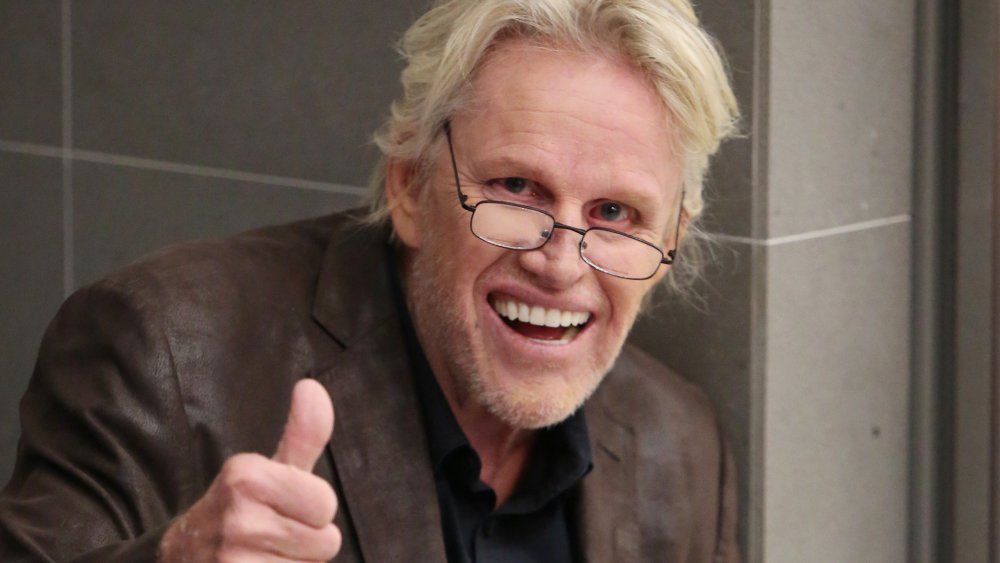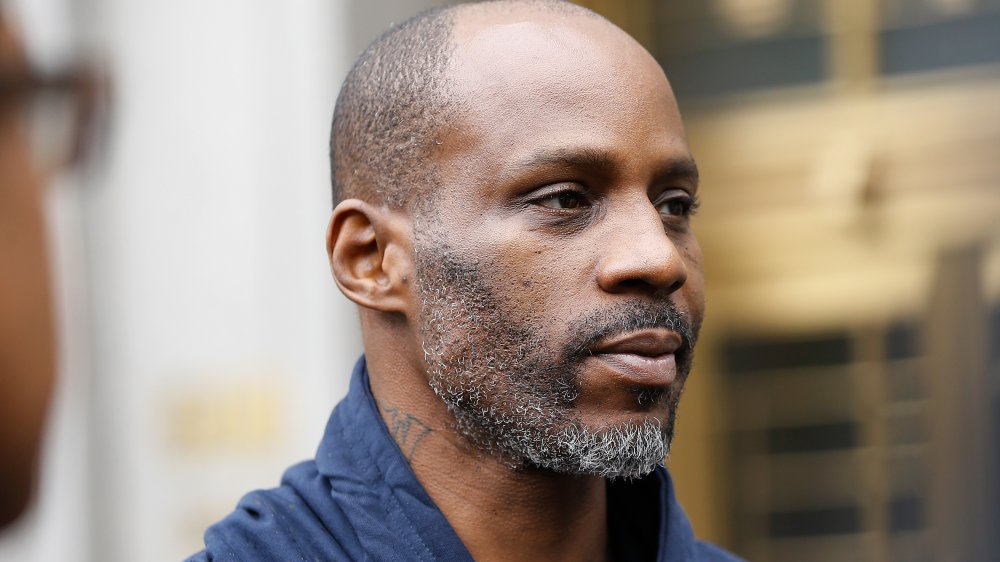Action Stars Who Went Broke
Once you're a star, you're a star — it makes going broke and staying broke next to impossible. Nearly any action star in Hollywood could give all of their money away, pick up a promotional deal, and end up right back on their feet, and some of them have, though they may never reach the enormous level of wealth they had when they were at their fiscal prime. That doesn't mean that our action heroes are rich all the time, however. An entertainer's earnings are never steady. They come and go like the tide, and if that entertainer doesn't hold enough back for those rainy days (or years), they can hit some definite financial lows.
Let's not forget that action stars are human, too, and some humans have a tendency to indulge, some to lie, and some to cheat the system. All of those characteristics can cause "fat stacks" to thin out, bank accounts to starve to death, and debts to pile up. Actors tend to become accustomed to a certain lifestyle, and some don't know how to budget for a more modest one when their careers inevitably fall from their peak. All of a sudden, those multimillion-dollar properties and mega-yachts become regrettable decisions when viewed through the marvelous, and often unfortunate, lens of hindsight.
Nicolas Cage plays Nicolas Cage losing most of his wealth
You may know him from his roles playing the same Nicolas Cage thrown into random storylines for the sake of cashing in on mediocre films, such as Nicolas Cage Ruins Ghostrider or Nicolas Cage Makes $20 Million Stealing The Declaration of Independence. With a slew of other high-paying films under his belt – Gone in 60 Seconds, Con Air, The Rock, etc. — Cage managed to bring in an estimated $200 million from acting in over 100 films, according to Celebrity Net Worth. Though celebrity worth calculations aren't always the most reliable, we can confidently say that Cage has made a ton of money. According to CNBC, he was once worth $150 million.
By 2018, however, CNBC estimated that his wealth had fallen to one-sixth of its peak (and he had to pay the IRS $6 million in 2012). How? Well, Cage is as big a spender as he is an earner. At one point, Cage owned 15 houses, some of which cost more than his biggest payday. Two of his homes were legit European castles. To go along with his real estate empire, he bought himself a private island and a pyramid burial chamber. His other totally normal eccentric-rich-guy-purchases include shrunken pygmy heads, exotic animals, comic books, and the late shah of Iran's personal Lamborghini, not to mention the time Cage outbid Leonardo DiCaprio for a T-rex skull, which he later returned after discovering it had been stolen from Mongolia, according to the BBC.
Burt Reynolds filed for bankruptcy in the '90s
Here's a name that made our mothers swoon for over 40 years: Burt Reynolds. Ol' Gator McKlusky has played every role under the sun, from action star to nude centerfold in Cosmopolitan. Reynolds' sly smile has become more of an icon in America than a sliced cheese and baseball sandwich, and his earnings throughout his career have proven it.
At the time Reynolds was at his peak back in the Smokey and the Bandit days, he was banking over $10 million per year, according to Vanity Fair. He had it all — a ranch in Florida, property in the Smoky Mountains and Arkansas, mansions in California, and 150 horses. He wore expensive suits, drove expensive cars, and owned expensive planes and helicopters. But after the Bandit's financial fall, he'd find that some of his expensive luxuries would turn into expensive debts.
The downward spiral of financial crises would hit Reynolds the hardest following his divorce from Loni Anderson in 1993, when Reynolds will shell out around $5 million in legal expenses, while also paying $9,000 per month for Anderson's mortgage and $15,000 in child support. At the time, Reynolds was "having cash flow problems" which were caused by a mix of spending habits, failed investments, and a faltering career. When CBS sued Reynolds for an outstanding $3.7 million loan in 1996, it was over. Reynolds had no choice but to file for bankruptcy.
Gary Busey definitely isn't rich now
Whether you know him as Uncle Red from Silver Bullet, the villain from Lethal Weapon, Frank McBain from Bulletproof, or any one of his other 100+ acting roles, Gary Busey's giant teeth are hard to forget. But he's more than just teeth. He's a talented actor who has five film award wins and eight nominations under his belt, according to IMDB. The man seems to have been everywhere, and he's made a bunch of cash doing it. Busey has always been on the hush as far as his earnings are concerned, so it's hard to say how much the actor made throughout his life. Given that many of his films had budgets over $15 million, he had to have made a decent amount of money.
Unfortunately, the money had dwindled away by 2012, leaving Busey with less than $50,000 to live on through a career that was well past its prime. According to TMZ, Busey's measly 50 grand was overshadowed by over $500,000 worth of debt, leading to a bankruptcy filing. The debts were spread out between the IRS, banks, lawyers, hospital bills, and a few random businesses like a storage company. The actor had also been sued for tackling a 57-year-old woman at an airport after a light day of intensive drinking, which probably added to the debt. For the record, Busey had no recollection of the events and claimed innocence.
Johnny Depp is good at making money and better at spending it
Make money, spend money — what else is an actor to do with their fortune? Problems come when the actor is spending more than they're making, which seems hard to believe when the "spender" is Johnny Depp and the "makings" are $650 million, but it's possible, courtesy of a legal battle between Depp and his former management.
Depp was suing for $25 million in allegedly mismanaged funds that cost him "tens of millions" in IRS late fees, illegal commission, and money given to his sister without his consent ($7 million), according to Rolling Stone. TMG slapped a countersuit, claiming Depp was just mad that they filed for foreclosure on Depp's home because he owed them more than $4 million from loans. The countersuit also claims Depp has a $2 million-per-month spending habit. Some of the frivolous things TMG claims Depp has dropped money on include $30,000 per month on wine and $3 million to shoot Hunter S. Thompson's ashes out of a cannon. Depp counters these allegations by saying he spent "far more" than that on wine, and the cannon stunt cost $5 million. Get your numbers straight.
According to Variety, Depp also dropped $18 million on a 150-foot yacht which he pilots to his private Caribbean island. He doesn't have the pirate ship we were all hoping for, but he and Jack Sparrow probably have the same amount of money in the bank.
Wesley Snipes claimed economic hardship against his tax debt
Unless you're marathoning Blade in preparation for cosplay, the only time you see this daywalker anymore is regarding his tax scandal. Wesley Snipes had a poppin' action career through the '90s and somewhat during the early 2000s that slowed way down following Blade: Trinity in 2004 for a number of reasons. Money wasn't coming in the way it did during Snipes' early career, but money wasn't being paid out to the IRS, either.
By 2018, Snipes had wracked up $23.5 million in tax debt, according to Forbes. The IRS has a history with Snipes that runs for more than ten years. The Demolition Man villain refused to pay his taxes between 1999 and 2001, claiming he wasn't legally obligated to pay them in the first place. The idea was put into his head by his accountant at the time, and the whole ordeal put Snipes behind $7 million on government dues. In 2008, Snipes was found guilty on three criminal charges of failing to file taxes while being acquitted for higher fraud charges. He received a three-year sentence.
Snipes paid off the back taxes from 1999 to 2004 and then attempted to negotiate his debt down in 2014 by offering the IRS almost $850,000 — a whopping four percent of what he owed. The IRS countered: They'd settle for $9.5 million. Snipes rejected it, claiming "economic hardship," but the IRS didn't buy it.
Don Johnson almost lost his home in 2004
Don Johnson was living the high life as he raked in between $35,000 and $100,000 per episode of Miami Vice in the '80s. He was one of the highest-paid television actors of the time, living in a $4 million ranch in Aspen, Colorado. His widespread fame made him a fashionable target for tabloids. But, the fame would fade over time, and the fortune would follow suit.
There was a big hoo-ha in 2003 over some financial documents that German customs found in Johnson's car which estimated his wealth at $8 billion in assets, but E! News says the papers that were found actually belonged to someone else. That would've been an impressive amount of money for a man who would file for bankruptcy on one of his companies just a year later to avoid losing his house. Don Johnson was in debt. City National Bank of Los Angeles was owed nearly $1 million, and they were going after Johnson's home to collect it, according to the Sioux City Journal. The bankruptcy filing served as a way for Johnson to stave them and other creditors off until he could get his finances in order, and there were a lot of other creditors.
The Denver Post says Johnson owed several businesses, too. He had hospital bills and owed law firms. His grocery bill had fallen far enough behind that the local tavern had a tip jar specifically to go toward the debt.
Chris Tucker owed more than he was worth
Chris Tucker brought a trove of quote-worthy lines to the Rush Hour franchise while kicking some serious booty next to Jackie Chan, and the films were a serious payday. Tucker made $3 million off the first and $20 million from Rush Hour 2, according to Variety. That's just one franchise. Tucker has more than 20 acting credits listed on IMDB, so his career should've been quite profitable. And it probably would've been if he'd kept up on his yearly taxes.
Forbes says Tucker piled up back taxes for over seven years, causing some major financial problems. Those issues weren't helped by Tucker falling out of the spotlight, either, seeing as he hasn't starred in a leading role since Rush Hour 3. The total debt was over $14 million, and the IRS meant to collect. Two separate liens were placed on the actor by 2014: one for $2.5 million and another for $12 million. In 2011, Tucker faced foreclosure of his home, a $6 million mansion in Florida that the actor still owed over $4 million on, according to CBS.
Between the home foreclosure and the tax debt, Tucker's net worth was sitting in the negative, according to the Lee Law Firm, which deals specifically with bankruptcy law. The actor did finally settle up with the IRS, and his reps adamantly say the debt wasn't his fault and laid the blame on poor management and accountants.
From rapper to actor to DMX the tax evader
Y'all gonna make us lose our minds if you don't already know about DMX's hip-hop career, but what you might not be as familiar with is his acting career. The rapper has acted in a handful of action movies, such as Never Die Alone and Exit Wounds, and had roles alongside Jet Li in Cradle 2 the Grave and Romeo Must Die. So yeah, DMX the action star is a real thing.
Admittedly, most of DMX's wealth came from his multi-platinum music career that kicked off in the late '90s. It's hard to say exactly how much the rapper-actor made at his peak, but it was millions. And, he worked really hard to keep the IRS away from it. He made his purchases in cash and didn't use bank accounts in his own name, according to the 2017 indictment. He apparently didn't try hard enough because he was charged with 14 counts of tax evasion, amounting to over $1.7 million in tax liabilities, not nearly as much as other actors who've made the list but enough to land him jail.
The tax evasion case actually came after DMX had already fallen on hard times. In 2013, he filed for bankruptcy due to over $1 million worth of back child support, according to Rolling Stone, as well as an auto lease he couldn't afford. At the time, he claimed to have had only $50,000 in assets.
Kim Basinger filed for bankruptcy after buying a small town
Okay, so Kim Basinger may not exactly be an action star, but she's been cast next to the action stars in several films. Basinger played Domino Petachi in Never Say Never Again, Michel Duval in No Mercy, Vicki Vale in Batman, and Carol McCoy in The Getaway. She also bought a small town.
The town of Braselton, Georgia, was once owned by Basinger. She bought it with a silent partner for a crisp $20 million in a mix between a publicity stunt and an investment opportunity, according to the Chicago Tribune. In truth, Basinger's name was used on the purchase, and her portion gave her majority interest in the bank. That's it. But that's what you get when your contribution is $250,000. The bank was sold off after Basinger filed for bankruptcy in 1993, but it's not the reason she went bankrupt.
Basinger's financial problems were primarily the result of being on the receiving end of a $8 million lawsuit for dipping out on the lead role in the movie Boxing Helena and costing Main Line Pictures $6.4 million in sales. Main Line said there was a verbal contract. Basinger disagreed. The lawsuit was eventually reversed, but not until after many of Basinger's assets had been liquidated.
The Queen of Westeros only had $5 in the bank
Lena Headey was a retired shadow hunter in The Mortal Instruments: City of Bones, queen of both the warring world of Westeros and of Sparta, and Sarah Connor of Terminator: The Sarah Connor Chronicles, and back in 2013, she was apparently broke.
Lena Headey and Peter Loughran divorced in December 2013, but during the struggle, Headey had fallen on hard financial times. According to Forbes, she'd just sold her house and had lost a couple hundred thousand on the sale. Headey claimed in court documents that she needed $6,000 of the couple's 2011 tax refund to cover living expenses since she had "less than $5 in the bank," according to TMZ.
In 2013, SyFy Wire claimed Headey was getting paid $150,000 per episode of Game of Thrones. Before taking Cersei, Headey had worked on several TV shows and movies and should've secured herself a hefty nest egg. Even with legal fees from the divorce, Headey shouldn't have needed to live off credit as her court documents state. According to the Law Offices of Paul H. Nathan, legal documents claim that the couple worked through their savings during Headey's pregnancy because she wasn't able to work. They had no choice but to live off credit cards, piling on debt that they'd have to cover when Headey was back on the screen. You know what they say: "A Lannister always pays his debts."










